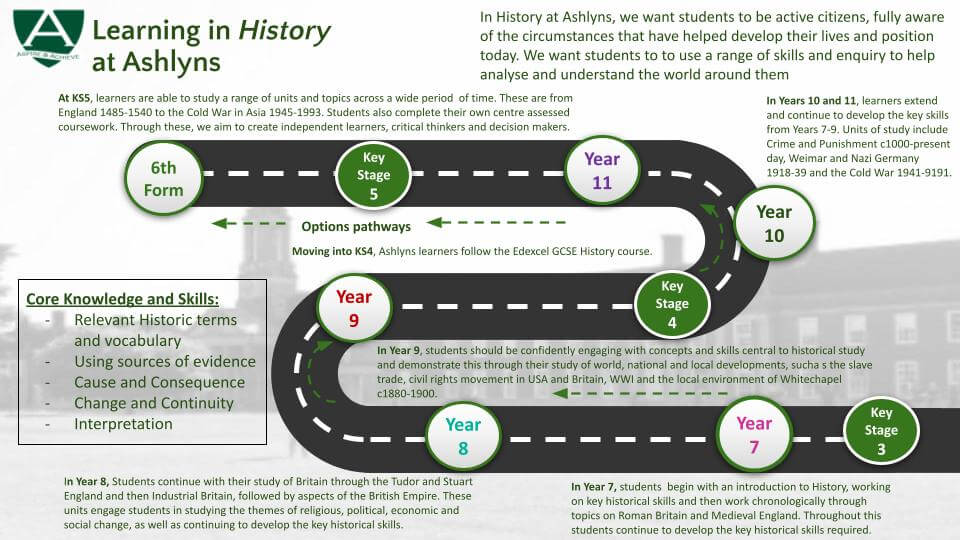History
The aims of the History curriculum at Ashlyns are:
- That students become active citizens fully aware of the circumstances that have led to their lives and position today. Students should therefore be able to investigate fully: The Norman invasion and its impact; The Reformation; the Industrial Revolution and Britain’s unique role in this; the impact of the British Empire; the Trans-Atlantic Slave Trade and Britain’s role in this; Britain’s role in conflict and international relations since 1900
- That students utilise historical enquiry as a toolkit to analyse and understand the world around them in history, both at an individual or local level as well as nationally and internationally
- That students explore the role of local history and its impact on their heritage

Key Stage 3
During KS3, we aim to develop students’ understanding of core historical concepts such as continuity and change, cause and consequence, similarity, difference and significance. We aim to develop ways for them to understand the methods of historical enquiry, including how evidence is used rigorously to make historical claims, and discern how and why contrasting arguments and interpretations of the past have been constructed. Finally, we help them to gain historical perspective by placing their growing knowledge into different contexts, understanding the connections between local, regional, national and international history; between cultural, economic, military, political, religious and social history; and between short- and long-term timescales.
Year 7
Students begin with an introduction to history through Roman Britain, recapping and extending work done in KS2 on Roman Britain, and working on a chronological understanding of pre-1066 Britain. Students then examine the Norman Conquest and its impact on developing English society, before a detailed study of Medieval England, and then an examination of the development of castles, which includes the opportunity for students to design and build their own. Year 7 History is concluded with a study of Islam, Christianity and the Crusades, developing their cultural understanding of non-British history.
Year 8
Students continue with their study of Britain through the ages, beginning with some work on life and society in Tudor England and then moving to a study of religious conflict and political quarrels in Britain at this time. Core historical concepts of causation, interpretation and continuity and change continue to be central to their study. The course then moves to a study of industrial changes, focusing closely on how people’s lives changes during the period 1750-1900. Year 8 History concludes with a close look at the origins of the Empire, examining the beginnings and impact of the British Empire and allowing students to think about this in relation to British Values.
Year 9
By Year 9, students should be confidently engaging with concepts central to historical study, such as causation, change and continuity, and interpretation, and confidently and accurately using evidence to support their historical study. They demonstrate these through a study of the slave trade, linking back to ideas surrounding British Values they studied in Year 8, and then through a close examination of the Civil Rights Movement. They then undertake a study of the First and Second World Wars and the interwar years, before finally beginning a closer examination of crime and punishment in Britain, with a focus on Whitechapel c.1870-1900. This popular unit concludes the KS3 history curriculum.
Key Stage 4
Our GCSE course extends and continues to develop the key skills students use at Key Stage 3. Through the Unit 1, Crime and Punishment through time, c1000-present day / Whitechapel, c1870–c1900: crime, policing and the inner city:The historic environment and Unit 2, Henry VIII and his Ministers, studied in Year 10 students are able to create their own valid historical judgements, assess the usefulness of evidence, explain how the significance of historical events can be judged and analyse what makes different time periods distinctive.
In Year 11, students continue to employ the above key skills through their study of Unit 3, Weimar and Nazi Germany 1918-39 and Unit 2, International Relations: The Cold War 1941-1991 and also identify why different interpretations of the past exist. Throughout, students will communicate through their use of appropriate historical vocabulary and knowledge.
Key Stage 5
History A level allows students to study a range of units and topics across a wide period of time. In Year 12, students study England 1485 – 1540: The Early Tudors (Enquiry topic: Mid Tudor Crises 1547–1558) and The Cold War in Asia 1945–1993 and in Year 13, Russia and its Rulers 1855–1964 and a Topic based essay, in which students may complete a piece of centre assessed work of their own choice. These units allow students to develop their skills in presenting historical explanations, assessing the significance of events, individuals and beliefs and movements and to reach substantiated judgements. Students will evaluate sources in order to reach judgements by analysis and evaluation and to address historical claims and debates. Our aim is to create independent learners, critical thinkers and decision makers, enabling many students to go on and study History successfully at university.
Learning beyond the classroom
Our programme includes: a trip to Berlin for Years 10-13; Year 12 Holocaust Educational Trust visit to Auschwitz; Holocaust survivor testimony for the whole school; Assemblies – Black History Month and commemoration of events such as WW1 / VE Day

